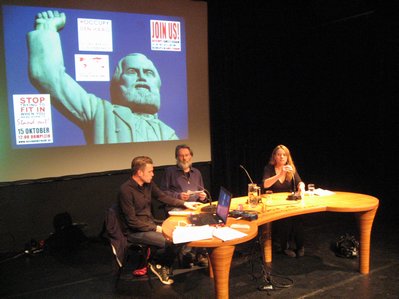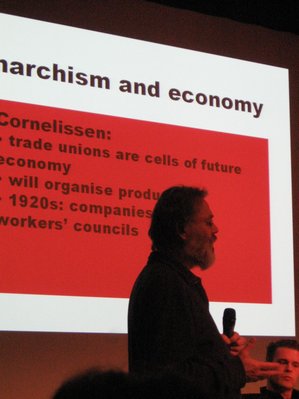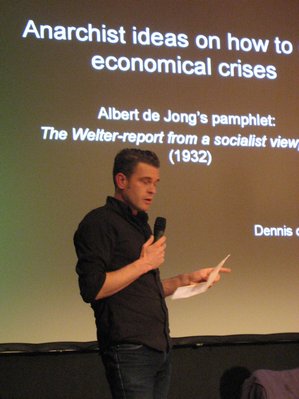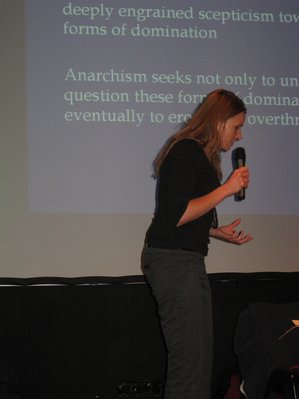Verslag/report of RWE 14 November: The political economy of anarchism
On November 14 the CREA-theatre gave place to a Real World Economics evening on The Political Economy of Anarchism. The speeches and slides can be found below.

Background of the program.
As an introduction the speakers are introduced by Kees Hudig, something is said about the history of anarchist movements in the Netherlands, and an arbitrary definition of anarchism (by Rudolf Rocker) (see the slides here)
 Bert Altena (Slides Bert), historian from Erasmus Universiteit in Rotterdam, describes roughly the ideas about economy since Proudhon. In the Netherlands one influential economical theoretician was Christiaan Cornelisse, a revolutionary syndicalist. Central in their thinking was their ideas about ’the market’ and private property.
Bert Altena (Slides Bert), historian from Erasmus Universiteit in Rotterdam, describes roughly the ideas about economy since Proudhon. In the Netherlands one influential economical theoretician was Christiaan Cornelisse, a revolutionary syndicalist. Central in their thinking was their ideas about ’the market’ and private property.
Altena sketches two main currents in anarchism, the individualists and the coordinated/collectivist side. The first current winded down into anarcho-capitalists (or ‘market anarchists’) who initially believed in e completely free market, but later agreed some regulation is needed. An example of modern collectivists is the Parecon-experiment.
Bert ends his introduction with a mention of the dissident Hungarian economist Janos Kornai and his book The Socialist System, which elaborated on the economy of the communist states.
Listen to the complete audio-file of the introduction and Bert Altena’s speech here.
 Second speaker was Dennis de Lange, who studied history and works as a teacher, and last year published a book on the followers of Tolstoy in the Netherlands. His story for the program focuses on a proposal that a Dutch anarchosyndicalist wrote, as an answer to austerity measures applied during the previous crisis in 1932 Slides Dennis
Second speaker was Dennis de Lange, who studied history and works as a teacher, and last year published a book on the followers of Tolstoy in the Netherlands. His story for the program focuses on a proposal that a Dutch anarchosyndicalist wrote, as an answer to austerity measures applied during the previous crisis in 1932 Slides Dennis
Albert de Jong wrote his pamphlet “The Welter-report from a socialist viewpoint (1932)” as a debunking of the austerity measures that had been proposed by the Welter-commission, established by the government. Albert de Jong was a prominent member of the anarcho syndicalist NSV. His pamphlet give a good insight in the ideas anarchists had at those days on the economy. But the tekst and the analysis and ideas from then still look very fresh and useful now. Hear Dennis’ introduction here.
 Angela Wigger is a political economist from the Radboud University in Nijmegen. She comes from a marxist background, but has recently been studying anarchist literature. For a conference on anarchist economics at the university of Warwick, she did some research on the different views anarchists and marxists have on competition. Slides Angela
Angela Wigger is a political economist from the Radboud University in Nijmegen. She comes from a marxist background, but has recently been studying anarchist literature. For a conference on anarchist economics at the university of Warwick, she did some research on the different views anarchists and marxists have on competition. Slides Angela
In her speech she elaborates more on the differences, and similarities of anarchism and marxism. She ends her story with a broad sketch of what an anarchist economy would look like.
The program ended with a round of remarks and questions from the audience. The subjects varied from the necessity to organize food collectively, the pro’s and cons of parecon (and division of labour and having too many meetings), how many Marxists believe in ‘direct democracy’ and and how many anarchists think private property is a good thing, how to do regulation without a state. You can hear that part here: Q en A.
Real World Economics will proceed organising this kind of events in the next year, you can stay informed here.